初中英语Unit1 Will people have robots SectionB人教版
八年级英语下册Unit1WillpeoplehaverobotsSectionB基础知识详解人教新目

福建省长泰县第一中学八年级英语下册《Unit 1 Will people have robots》Section B基础知识详解人教新目标版一、课文详解(一)生词1. space (1) n. [U] unoccupied are or place available for use 空间 eg:Is there space for one more person in the car? 车里可以再坐一个人吗?2. n. [U] universe beyond the e arth’s atmosphere 太空 eg:He was the first man to walk in space. 他是在太空漫步的第一个人。
注意:space意为“太空”时,一般不用冠词,但被形容词修饰时可用the。
eg:in the dark space 在黑暗的太空中2. fly (1) v. to travel in an aircraft or a spacecraft 飞行;航行 eg:My father flew to Bei jing yesterday. 昨天我父亲乘飞机去了北京。
(2) v. to control or direct the flight of (an aircraft, etc.) 开飞机;驾驶(飞行器等) eg:He was the first man ever to fly that type of aircraft. 他是驾驶那种飞机的第一人。
3. fall (1) v. to drop or descend 落下;跌落 eg:H e fell off his bike and broke his leg. 他从自行车上跌下了,断了腿。
(2) v. to become 变为 eg: Has she fallen ill again? 她又病了吗?(3) n. act or instance of falling 落下;跌落 eg: I had so ma ny falls that I was blue and black all over. 我跌了那么多跟头以至于浑身青一块紫一块。
八年级英语下册Unit1Willpeoplehaverobots_SectionA课件
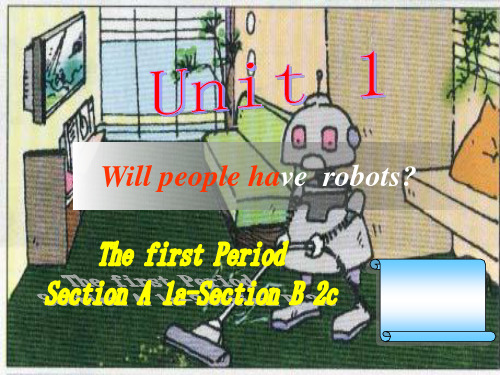
I think cities 来自ill be really big and crowded because there will be a lot more people.
Language points:
4. Kids won’t go to school. They’ll study at home on computers.
5. There will only be one country. 6. People will live to be 200 years old.
Read after the teacher
√ 5. Cities will be very big and crowded.
Read after the teacher
Woman: OK, now I want to hear everyone’s predictions about the future.
Girl 1: Well, I think there will be more people.
Boy 1: Well, I don’t think people will
use money.
Boy 2: Do y免ou费t的hink everything will
be free? probable
Boy 1: Yeah, probably.
Boy 2: I think there will be only one
1a Some more predictions about things in 100 years.
Do you think there will be robots in people’s homes?
新课标人教版八年级英语下册Unit 1 Will people have robots--SECTI

Unit 1 Will people have robotsPart 1: Teaching designSECTION AGoals● Learn to use questions with more, less, fewer ● Learn to express future with will● Learn to answer Yes/ No questions with short answers ProceduresStructuresFuture with will; Yes/No questions with short answers Questions with more, less, fewerTarget languageWhat do you think life will be like in 100years? Every home will have a robot.Will kids go to school? No, they won’t. They will study athome.There will be fewer trees.V ocabularyRobot, pollution, astronaut, apartment, rocket, space station, moon free timeLearning strategiesGuessing sequencingWarming upChoice 1Warming up by watching The Story of Robot WarsHello, everyone! Nice to see you back at school after the winter holidays. How did you spend your Spring Festival?Now I am going to show you a film called The Story of Robot Wars. What is a robot? Yes, it is 机器人. The story goes like this:All the robots at the governmental institute of robots were shut down for the night, Suddenly in a flash of light they all got beamed to another planet! And then they all automatically turned on they saw that they were in a giant arena. Suddenly a monitor appeared, and on it a giant robot it said "let me explain, I am the champion robot, and I need entertainment, my newest entertainment is the "Robot Wars". It’s where you robots fight each other with missiles, lasers etc. Now eventually you will get to the point where there will other robots from other institutes for you to fight, and eventually one of you will fight me, now when you score a point by hitting your opponent you get a weapon" and with that they all got beamed to separate arenas and so the fight for freedom began.Choice 2Warming up by Learning about grammarWele back to school. Now turn to page 3, and look at the grammar focus.Will there be less pollution? No, there won’t. There will be more pollution.Will there be fewer trees? Yes, there will.Kids won’t go to school.Kids will study at home on puter.Now give attention to the blacken words. Will is used here to express future event.More examples: I will have English classes this afternoon.He won’t go to school tomorrow.The form of the usage is: will+verb.Now let’s have a game to make senten ces with will to see who will say the most sentences with will.1aReading and checkingNow let’s go to page 2. There are 6 statements here. Read them and check A if you agree with the prediction. If you disagree with any of them check D.What is a prediction?A statement foretelling the possible oute(s) of an event, process, or experiment. In meteorology, a prediction is also called a forecast. A prediction is based on observations, experience, and scientific reasoning. A guess, on the other hand, isbased on conjecture (speculation), chance, and intuition.1b Listening and circlingListen and circle the predictions you hear in activity 1a.Next you are to read the tapescript to blacken the predictions you hear in 1a. While reading you may try to find out the pauses between the thought groups.1c Doing pairworkDo you predict? Now in pairs ask and answer questions about the predictions in 1a.A: Will people use money in 100 years?B: No, they won’t. Everything will be free. Will people live to 200 years old?A: Yes, they will.A: Will people have robots in their homes?B: Yes, they will.A: Will books be only on puters?B: No, they won’t. There will be still paper booksin the future.A: Won’t kids go to school?2a Listening and circlingListen and circle the words you hear.Next you are to read the tapescript to underline the useful expressions. While reading you may try to find out the pauses between the thought groups.2b Listening againYou are to listen again. Check the predictions you hear on page 3.2c Doing groupworkLook at activity 2b. You are to make conversations about the predictions.3a Looking and filling7. In five years, Sally will be married.8. She will play badminton with her husband.9. She will have a baby daughter.3b Doing pairworkNext you are to look at 3a and make predictions about Sally.A: What do you think Sally will be in five years?B: I think she’ll be a doctor.A: What sports will she play?B: She’ll play tennis, I think.A: What do you think Sally will be in five years?B: I think she’ll be a housewife.A: What baby will she have?B: She’ll have a baby daughter, I think.3c Writing about yourselvesYou will look back, look ahead and write about yourselves.Five years ago Today In five yearsI was in primary school.I played ping-pong.I had a robot cat. I am in junior school.I play basketball.I have a robot snake.I will be in college.I will play football.I will have a robot friend.Doing groupworkYou will draw a picture of the tomorrow city. And you will describe it to your class.A: I think there will be more tall buildings. And there will be fewer cars and more buses.Closing down by reading a poem about the future Traverse : Into The Futureby Je ' FreeWhat I say now may be elementary -Once man unravels time and its mysteryWe travel to the past by memory Imagination’s what our future will beDelve in the theories of the human mindsIt’s heaven or hell or in between those lines Push to one direction, a radical turnWe see this paradox a great concernWe have explored it almost endlessly -How we can change the course of history Kaleidoscopic the world seems to beWe need a mechanism to set us freeTraverse the unreached boundaries...Where there’s no war, poverty, and pollutionTraverse the possibilities...Where there’s no environmental devastation Traverse the unknown energy...Where there’s a parallel dimension disguised Traverse levels of this mystery...Where we will be spending the rest of our lives。
八年级英语下册 Unit 1 Will people have robots(第三课时 Sectio

Unit 1Will people have robots?第三课时 Section A (3a--4) Teaching and learning goals:In this lesson, students will make predictions about Sally. Then they will use the same sentence structure to make predictions about themselves and the city. By making predictions, students could get visions of their own future. Also it could arouse their interests and broaden their minds.Teaching and learning steps:Step 1: ReviewAsk the students to read the dialogue of section A. Two students will work in a group. Then I will ask several pairs to act it out in front of the class.A: Do you think there will be robots in people’s homes?B: Yes, there will. I think every home will have a robot.A: Will kids go to school?B: Kids won’t go to school. They’ll study at home on puters.(设计意图:让学生加深对本单元的认识,并且复习there will be 句型,为后面的学习做好铺垫。
人教新课标 八年级下 Unit1 Will people have robots Section A教案

Unit 1 Will people have robots? Section ASection A一、主要词汇:robot, credit card, pollution二、语言目标:1. ---Do you think there will be robots in people’s homes?---Yes, there will.2. I think every home will have a robot.3. Kids won’t go to school.4. ---Will there be any paper money in 100 years?---No, there won’t.5. There will be more people.6. ---What do you think Sally will be in five years?---I think she’ll be a doctor.7. ---What sport will she play?---She’ll play volleyball.三、语言结构:1. will+动词原形(be, do)表示将来发生的事;2. I think句型3. there be 句型的一般将来时4. more, less, fewer的用法四、学法向导:1.会运用本单元的英语畅想“我的未来不是梦”;2.会用英语和他人进行“未来宇宙”的话题交谈;3.绘出一幅“未来蓝图”并用英语进行图解;4.会用英语进行采访:十年后的你。
五、教学过程I 放完第一段视频后,①请本地教师组织教学,学生小组活动1a(教师)1. Point to the columns of As and Ds and say, A means agree, D means disagree. Circle D if you think the sentence will not be true. Circle A if you think the sentence will be true.(教师)2. As students work, move around the room answering any questions students may have. (教师)3. Talk about the answers with the class. All students will probably not have the same answers. Point out the example in the speech bubbles and ask two students to read it to the class. Help students make their own statements using language from the example.1b(教师)1. Read the six predictions to the class or have a student do it.(教师)2. Read the instructions to students. Say, As you listen, circle the things you hear on therecording.(教师)3. Play the recording the first time. Students only listen.(教师)4. Play the recording the second time. This time say, Now listen to the conversation again. The people are making predictions about the future. Circle the predictions they talk about on the recording.(答案)Students circle 1, 2, 4, 5(听力材料原文答案)TapescriptBoy 1: Do you think people will have robots in their homes in 100 years?Boy 2: Yes, I do. I saw a robot on TV, and it cleaned the kitchen.Boy 1: Well, I don’t think there will be any paper money.Boy 2: Do you think everyone will have a credit card?Boy 1: Yeah, probably.Boy 2: I think there will be only one country.Boy 1: Only one country in the whole world? Will there be world peace?Boy 2: I hope so.Boy 1: I bet kids won’t go to school. They’ll study at home on computers.Boy 2: Oh, I disagree.Boy 1: You do?Boy 2: Yeah, there will always be schools.1c(教师)1. Read the instructions.(教师)2. Ask two students to read the example in the sample dialogue.(教师)3. Help other students make one or two other predictions using statements like those in the sample dialogue. Point to an item in activity 1a and read it to the class. For example, Books will only be on computers. Help the student from the question, Will there be books in 100 years? Then help another student give the answer. He or she can say either, Yes, there will or No, there won’t. Books will only be on computers.②全班讨论Ask students to predict what will happen at an upcoming school event such as a soccer game or a school party. They can make statements and agree or disagree with each other. For example, Our team will win the game. We’ll get ten points. The other team won’t score any points. Write some of the predictions on the board.II 放完第二段视频后,①请本地教师组织教学,学生小组活动2a(教师)1. Play the recording the first time. Students look at the list of words and listen to the recording.(教师)2. Play the recording a second time. This time students circle the words they hear on the recording.(答案)cars leisure time trees pollution people(听力材料原文答案)TapesciptWoman: Ok, now I want to hear everyone’s predictions about the future.Girl 1: Well, I think there will be more people.Woman: More people? OK. What else?Boy 1: I predict that there will be less leisure time.Woman: I hope not!Girl 2: Well, I think there will be fewer cars.Woman: You do?Girl 2: Yes, people will use the subways more.Woman: That’s a good idea. Let’s hear another prediction.Boy 2: There will be less pollution.Woman: That will be good for the earth!Girl 1: I think there will be fewer trees. I think cities will be really big and crowded because there will be a lot more people.2b(教师)1. Point out the list of predictions and ask different students to read the predictions to the class.(教师)2. Read the instructions and point out the sample answer.(教师)3. Play the recording. This time students circle the word they hear on the recording in each sentence: more less or fewer.(答案)1. more 2. fewer 3. fewer 4. less 5. less2c(教师)1. Read the instructions.(教师)2. Point to the example in the sample dialogue. Ask two students to read the conversation to the class.(教师)3. Point out the sentences in activity 2b. Read the dialogue again and ask students to point to the sentences that the two students are talking about.(教师)4. Then have students work in groups of four. They take turns making predictions about the future and agreeing or disagreeing with each other. As they ask and answer the questions, move around the room checking their work.(教师)5. Check the answers by calling on different groups to say a conversation to the class.②全班做游戏Play a game with countable and uncountable nouns. Divide the class into two teams. Make statements using the word more plus an countable noun or an uncountable noun. For example, You need more water or You need more eggs. First one team say the statement, then the other changes their statements into another statement that uses a specific quantity. For example, You need more salt might become You need a teaspoon of salt. You need more eggs might become You need three eggs. Each correct answer is worth one point.III 放完第三段视频后,请本地教师组织教学,学生小组活动(教师)1. Point to the three pictures and say, This is Sally. This is Sally five years ago, this is Sally now, and this is Sally, five years in the future.(教师)2. Read the instructions. Point out the sample answer and ask a student to read it to the class.(教师)3. Ask students to complete the work on their own.(答案)1. in high school 2. soccer 3. a cat 4. in college 5. the guitar 6. a dog 7. a doctor 8. tennis 9. a sports car (a child)3b(教师)1. Read the instructions.(教师)2. Point to the example in the sample dialogue. Ask two students to read the dialogue to the class.(教师)3. Point out the pictures in activity 3a. Read the dialogue again and ask students to point to the picture they are talking about.(教师)4. Then have students work in pairs. As they make their predictions, move around the room checking their work.(教师)5. Check the answers by calling on different students to make predictions about Sally.3c(教师)1. Read the instructions.(教师)2. Give an example from your own experience. You may ask a good student to do this instead if you would prefer.(教师)3. Ask a few students to give examples. Correct any grammatical errors to make sure the students are providing a good model for the rest of the class.(教师)4. Ask students to complete the work on their own.(教师)5. Review the task. Ask a few more students for answers.4(教师)1. Read the instructions. Say, This activity has two parts --- drawing a picture and talking about it.(教师)2. Ask students to draw pictures on their own. Move around the room helping students get ideas if they are having trouble. For example, you can say, How about some parks, lots of green parks? You could draw some bicycles or special roads for bicycles.(教师)3. Ask students to show their pictures to other students and describe what they drew. 注:黑色的斜体字是老师在课上组织教学时所用到的语言。
八年级英语下册 Unit 1 Will people have robots? Section pe
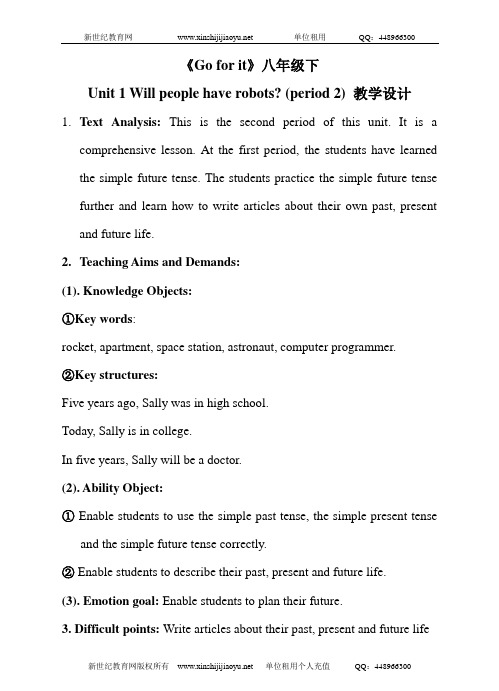
《Go for it》八年级下Unit 1 Will people have robots? (period 2) 教学设计1.Text Analysis:This is the second period of this unit. It is acomprehensive lesson. At the first period, the students have learned the simple future tense. The students practice the simple future tense further and learn how to write articles about their own past, present and future life.2.Teaching Aims and Demands:(1). Knowledge Objects:①Key words:rocket, apartment, space station, astronaut, computer programmer.②Key structures:Five years ago, Sally was in high school.Today, Sally is in college.In five years, Sally will be a doctor.(2). Ability Object:①Enable students to use the simple past tense, the simple present tenseand the simple future tense correctly.②Enable students to describe their past, present and future life.(3). Emotion goal: Enable students to plan their future.3. Difficult points: Write articles about their past, present and future life4. Teaching method:Task-based.5. Teaching Aids: Multimedia.6. Teaching processListen to a song(以歌曲导入,引人入胜)—Ask and Answer(操练和熟悉重点句型)—看图说话(链接中考)—Guessing games(复习词汇)—Listening (捕捉细节信息,完成表格)—Guess(获取信息,引起学生兴趣)— Role play(通过对话,练习句型)—Report(熟练掌握句型,口头作文) —Summary(归纳总结本课重点内容)—Homework(通过写作,巩固练习)7. Teaching Procedures:Step1 Warm upListen to a song【设计思路】:通过欣赏经典歌曲Yesterday once more,引导学生回忆自己过去的生活,为下一环节,回答有关过去生活的问题做铺垫。
八年级英语下册Unit1WillpeoplehaverobotsSectionA基础知识详解无答案人
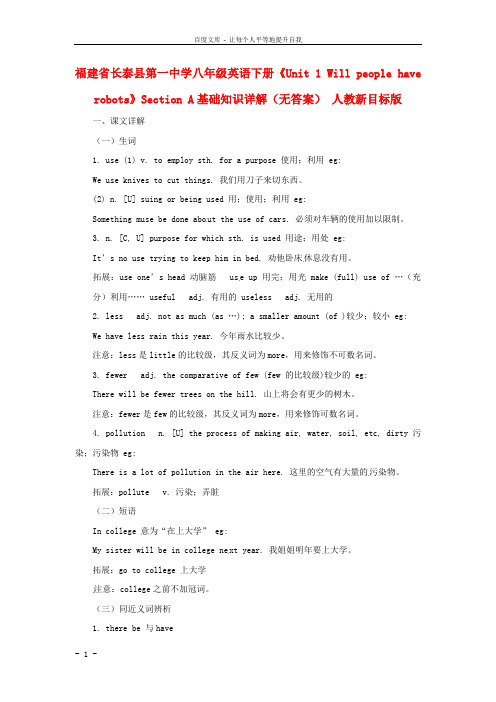
福建省长泰县第一中学八年级英语下册《Unit 1 Will people have robots》Section A基础知识详解(无答案)人教新目标版一、课文详解(一)生词1. use (1) v. to employ sth. for a purpose 使用;利用 eg:We use knives to cut things. 我们用刀子来切东西。
(2) n. [U] suing or being used 用;使用;利用 eg:Something muse be done abo ut the use of cars. 必须对车辆的使用加以限制。
3. n. [C, U] purpose for which sth. is used 用途;用处 eg:It’s no use trying to keep him in bed. 劝他卧床休息没有用。
拓展:use one’s head 动脑筋 us e up 用完;用光make (full) use of …(充分)利用…… useful adj. 有用的 useless adj. 无用的2. less adj. not as much (as …); a smaller amount (of )较少;较小 eg:We have less rain this year. 今年雨水比较少。
注意:less是little的比较级,其反义词为more,用来修饰不可数名词。
3. fewer adj. the comparative of few (few 的比较级)较少的 eg:There will be fewer trees on the hill. 山上将会有更少的树木。
注意:fewer是few的比较级,其反义词为more,用来修饰可数名词。
4. pollution n. [U] the process of making air, water, soil, etc, dirty 污染;污染物 eg:There is a lot of pollution in the air here. 这里的空气有大量的污染物。
八年级英语下册unit1 will people have robots_section A课件人教版
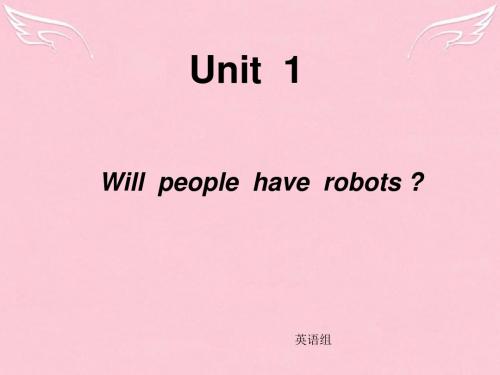
Will there be four-legged jeans ?
will / shall引导的一般将来时:一般将来时表示将来发生的动作或情况, 最基本的结构:will / shall + 动词原形 “主谓(宾)句型”的一般将来时: 肯定句:主语+ will / shall +动词原形+(宾语)+其他成份 People will have robots in their homes. 否定句:在will / shall 的后面加not即可。will not = won’t People will not (won’t) have robots in their homes. 一般疑问句:把will / shall 提到句子主语之前,结尾变问号。 Will people have robots in their homes? 特殊疑问句:特殊疑问词+will +主语+动词原形+其他成份? When will people have robots in their homes?
Unit 1
Will people have robots ?
英语组
When I was just a little girl I asked my mother "What will I be? Will I be pretty? Will I be rich?" Here's what she said to me "Que Sera, Sera Whatever will be, will be The future's not ours to see Que Sera, Sera What will be will be.” When I grew up and fell in love I asked my sweetheart "What lies ahead? Will we have rainbows day after day?" Here's what my sweetheart said "Que Sera, Sera Whatever will be, will be The future's not ours to see Que Sera, Sera What will be will be."
新目标英语八年级下Unit1 Will people have robots-教案
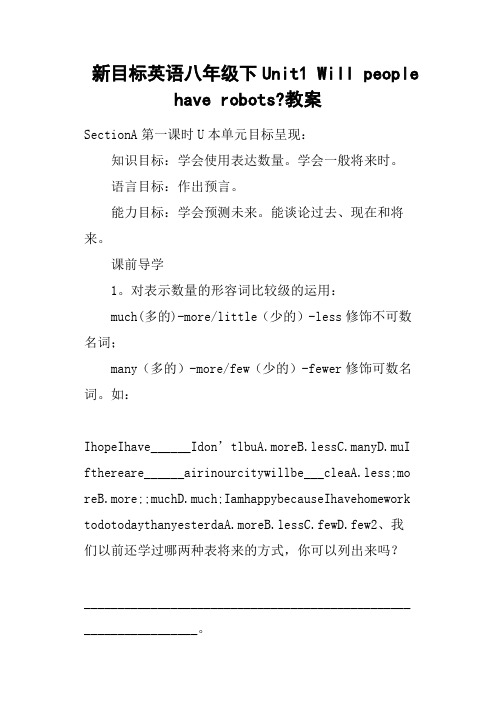
新目标英语八年级下Unit1 Will peoplehave robots?教案SectionA第一课时U本单元目标呈现:知识目标:学会使用表达数量。
学会一般将来时。
语言目标:作出预言。
能力目标:学会预测未来。
能谈论过去、现在和将来。
课前导学1。
对表示数量的形容词比较级的运用:much(多的)-more/little(少的)-less修饰不可数名词;many(多的)-more/few(少的)-fewer修饰可数名词。
如:IhopeIhave______Idon’tlbuA.moreB.lessC.manyD.muI fthereare______airinourcitywillbe___cleaA.less;mo reB.more;;muchD.much;IamhappybecauseIhavehomework todotodaythanyesterdaA.moreB.lessC.fewD.few2、我们以前还学过哪两种表将来的方式,你可以列出来吗?__________________________________________________________________。
_________________________________________________ __________________。
3、本单元我们要学习什么时态,你知道吗?请举两个例子。
_________________________________________________ _______________。
_________________________________________________ _______________。
课堂反馈。
I、翻译下列短语在人们家里在家用电脑学习将来一百年后更少的污染活到二百岁空闲时间赞同某人II、根据所给首字母和句子的意思填写正确的单词(5分)Thesedayseveryoneu__________computerstodoalg2. Idon’tawTherearealotofbinouIwillbworkforusinthef utuWe’llhavemoref__________timetoplaIII、用所给词的正确形式填空Therearemanynew_________(build)inou2.Wecandotheworkwith_________(little)moneyand________(few)peopl ethantheycaaybehewantstogo_________(skate)Ibeliev ethaarsIwillworkfor____________.(me)Thereare_____ ____(hundred)ofpeopleonthegroundThere_______(not) beanypaperbooks.EveryonewillhavebuWeallwant______ _______(predict)thefutureofourselvWheredoyouthink Sally_____________(work)tenyeaw?Theboy__________( fly)toNewYorktwodaysago,andhe’llbeba0.____(be)yo uatschoolyesterdayevening?WehadanexcitingpaDoeshe always_______________(live)alone?Idon’tknow2.--W Lu?--I’mnotsure.______he_______(write)?uldyouplease ___________(buy)somesna?WhenIgrowup,I____________ ___(be)afamouspildLizoften___________(wash)herclo thesonWednesda第二课时SectionAU前导学Will(将要)表示将来,用于一般将来时。
初中英语人教版八年级下册Unit 1 Will people have robots
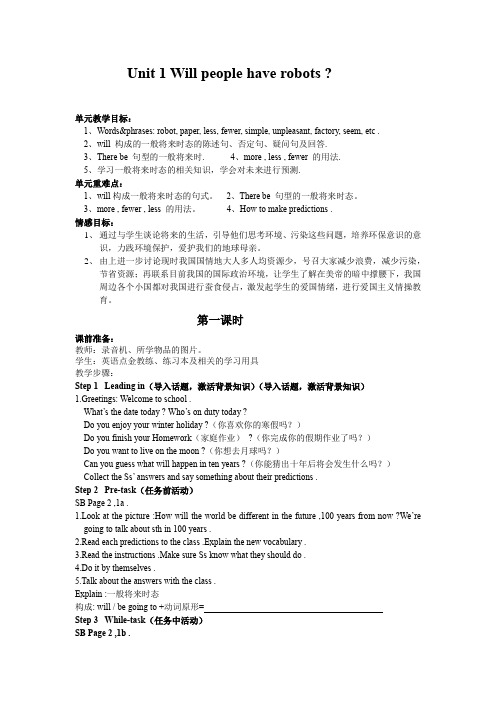
Unit 1 Will people have robots ?单元教学目标:1、Words&phrases: robot, paper, less, fewer, simple, unpleasant, factory, seem, etc .2、will 构成的一般将来时态的陈述句、否定句、疑问句及回答.3、There be 句型的一般将来时.4、more , less , fewer 的用法.5、学习一般将来时态的相关知识,学会对未来进行预测.单元重难点:1、will构成一般将来时态的句式。
2、There be 句型的一般将来时态。
3、more , fewer , less 的用法。
4、How to make predictions .情感目标:1、通过与学生谈论将来的生活,引导他们思考环境、污染这些问题,培养环保意识的意识,力践环境保护,爱护我们的地球母亲。
2、由上进一步讨论现时我国国情地大人多人均资源少,号召大家减少浪费,减少污染,节省资源;再联系目前我国的国际政治环境,让学生了解在美帝的暗中撑腰下,我国周边各个小国都对我国进行蚕食侵占,激发起学生的爱国情绪,进行爱国主义情操教育。
第一课时课前准备:教师:录音机、所学物品的图片。
学生:英语点金教练、练习本及相关的学习用具教学步骤:Step 1 Leading in(导入话题,激活背景知识)(导入话题,激活背景知识)1.Greetings: Welcome to school .What’s the date today ? Who’s on duty today ?Do you enjoy your winter holiday ?(你喜欢你的寒假吗?)Do you finish your Homework(家庭作业)?(你完成你的假期作业了吗?)Do you want to live on the moon ?(你想去月球吗?)Can you guess what will happen in ten years ?(你能猜出十年后将会发生什么吗?)Collect the Ss’ answers and say something about their predictions .Step 2 Pre-task(任务前活动)SB Page 2 ,1a .1.Look at the picture :How will the world be different in the future ,100 years from now ?We’re going to talk about sth in 100 years .2.Read each predictions to the class .Explain the new vocabulary .3.Read the instructions .Make sure Ss know what they should do .4.Do it by themselves .5.Talk about the answers with the class .Explain :一般将来时态构成: will / be going to +动词原形=Step 3 While-task(任务中活动)SB Page 2 ,1b .1.Practise reading the six predictions .2.Read the instructions to Ss .Circle the things you hear on the recording .3.Play the tape twice .(放录音,两次)4.Play the tape a third time .At the same time ,check the answers .SB Page 2 , 1c .1、Pay attention to the dialogues .2、Read the dialogues fluently .3、Pairwork .Work in pairs to make predictions according to the sample .4、Ask several pairs to share their conversations to the class .SB Page 3 , 2a & 2b .1、Read the predictions .2、Read the instructions and point out the sample answer .3、Play the tape twice .Ss circle the word they hear in each sentences: more , less , fewer .4、Check the answers .学生探究: less , fewer 的区别。
[八年级英语课件]Unit1WillpeoplehaverobotssectionB[下学期]新目标
![[八年级英语课件]Unit1WillpeoplehaverobotssectionB[下学期]新目标](https://img.taocdn.com/s3/m/e50e180871fe910ef12df8f4.png)
争求意见时常用于第二人称。 Which paragraph shall I read first. Will you be at home at seven this evening?
2) be going to +不定式,表
Learn more about the world
moon
astronaut
rocket
space station
Mars
What are they about?
Jobs
astronaut
computer programmer
Transportation Places to live
rocket train
I'm going to play football tomorrow afternoon. (主观安排)
句子解释
1.He thought that computers would never be used by most people.
That引导的是一个宾语从句,that 在 宾语从句中只起到引导作用,没有词
Mars. 8. I _________ on a space station.
’ll live ’ll fly work lived am took ’ll be live
Listen again. Fill in the blanks with the correct verbs.
1. I ___li_v_e___in an apartment. 2. I ___w_o_r_k__near here. 3. I ___a_m____a computer programmer. 4. We_l_iv_e_d___ in a house. 5. I ___t_o_o_k___ the train to school. 6. I ___’ll_b__e___ an astronaut. 7. I ___’l_l _fl_y___ rockets to the moon and
人教版英语八年级下册Unit1《Willpeoplehaverobots》SectionA1

_cl_e_a_n_e_d_ the kitchen. A: Well, I don’t think people _w_i_ll _u_s_e money. B: Do you think everything will _b_e _fr_e_e_? A: Yeah, _p_r_o_b_a_b_l_y. B: I think there will be _o_n_ly_ one _c_o_u_n_t_r_y .
Will there be more
less
fewer
A: What will our life in the future? B: I think there will be more cars. C: I disagree. I think there will be fewer cars. A: How about trees? B: Report: In our Group. Liu Ying thinks there will be more cars. But Tom disagrees. He thinks there will be fewer cars.
Look! fewer Use fewer to talk about countable nouns.
e.g. There will be fewer trees. There will be fewer people.
less Use less to talk about uncountable nouns. e.g. There will be less pollution. There will be less free time.
【英语】八年级英语下册Unit1Willpeoplehaverobots知识点复习人教新目标版
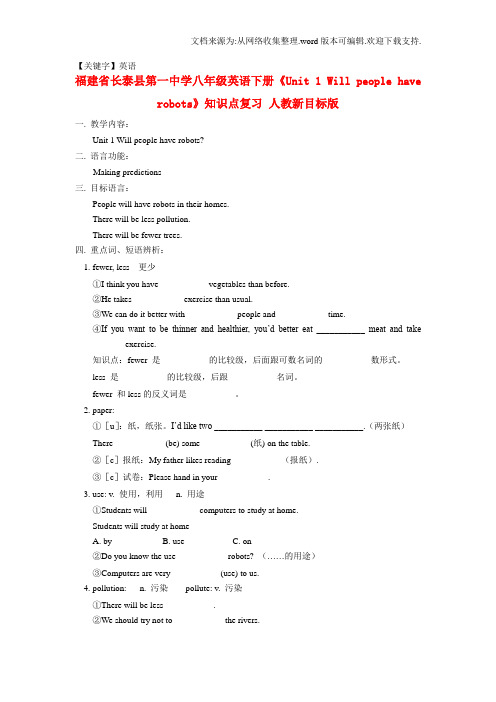
【关键字】英语福建省长泰县第一中学八年级英语下册《Unit 1 Will people have robots》知识点复习人教新目标版一. 教学内容:Unit 1 Will people have robots?二. 语言功能:Making predictions三. 目标语言:People will have robots in their homes.There will be less pollution.There will be fewer trees.四. 重点词、短语辨析:1. fewer, less 更少①I think you have ___________vegetables than before.②He takes ___________ exercise than usual.③We can do it better with ___________ people and ___________ time.④If you want to be thinner and healthier, you’d better eat ___________ meat and take ___________ exercise.知识点:fewer 是___________的比较级,后面跟可数名词的___________数形式。
less 是___________的比较级,后跟___________名词。
fewer 和less的反义词是___________。
2. paper:①[u]:纸,纸张。
I’d like two ___________ ___________ ___________.(两张纸)There ___________ (be) some ___________(纸) on the table.②[c]报纸:My father likes reading ___________(报纸).③[c]试卷:Please hand in your ___________.3. use: v. 使用,利用n. 用途①Students will ___________ computers to study at home.Students will study at homeA. byB. useC. on②Do you know the use ___________ robots? (……的用途)③Computers are very ___________(use) to us.4. pollution: n. 污染pollute: v. 污染①There will be less ___________.②We should try not to ___________ the rivers.③空气污染___________ pollution5. fly to ___________ moon 飞上月球6. fall: (v. p. fell) 落下,跌落,变为①He went to Shanghai last year and _________ _________ _________ _________ it.(爱上……)②He was so tired that he ___________ ___________(入睡,睡着)quickly.③You should study hard, or you will ___________ ___________. (落后)④In falls(秋天), the leaves fall ___________ the tree.⑤Look! A boy is falling ___________ the water.7. alone: adv. 单独地;lonely: adj. 孤独的,①The old woman lives ___________, but she doesn’t feel ___________.②我一个人在家里。
